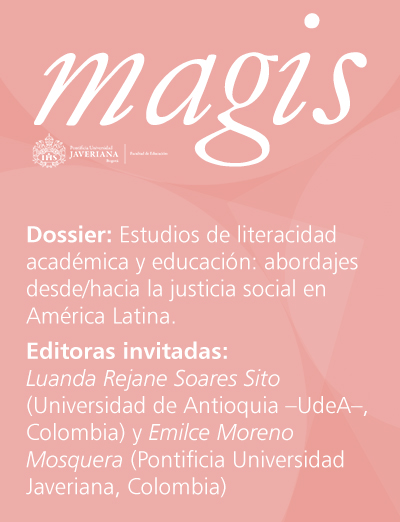Abstract
This research article aims to discuss the role of the Black university movement in the context of recent changes within Brazilian universities, using as a reference the actions carried out by the Centro de Convivência Negra (CCN), a group of Black students from a Brazilian public university. Grounded in an ethnographic perspective as a theoretical and methodological framework, this investigation draws on the concepts of belonging and transformative practices from Academic Literacies studies, as well
as the notion of the Black educator movement in the field of ethnic-racial relations. The methodology involved observing the CCN’s everyday activities, which generated the data analyzed: excerpts from interviews with one of the participants and a newsletter produced by the group. Contributing to the debate on inclusion and equity policies in higher education, the findings indicate that contemporary Black movements function as agents of racial justice, understood as a fundamental aspect of social justice across various domains, including education. Accordingly, the analyses suggest that the group under study seeks to foster a sense of academic belonging among Black students through literacy practices in academia, taking into account the diversity of their trajectories and identities.
Fanon, F. (2008). Pele negra, máscaras brancas. Ed. UFBA.
Gomes, N. L. (2003). Cultura negra e educação. Rev. Bras. Educ. (23), 75-85. https://doi.org/10.1590/S1413-24782003000200006
Gomes, N. L. (2017). O movimento negro educador: saberes construídos nas lutas por emancipação. Editora Vozes.
Green, J. L., Dixon, C. N., & Zaharlick, A. (2005). A Etnografia como uma lógica de investigação. Trad. Adail Sebastião Rodrigues Júnior e Maria Lucia Castanheira. Revisão técnica de Marcos Bagno. Educação em Revista, 21(42). 13-79. https://periodicos.ufmg.br/index.php/edrevista/article/view/45228
Ivanič, R. (1998). Writing and Identity: The Discoursal Construction of Identity in Academic Writing. John Benjamins.
Lea, M. R. (2016). Academic literacies: looking back in order to look forward. Critical studies in teaching & learning, 4. https://www.semanticscholar.org/paper/Academic-literacies%3A-looking-back-in-order-to-look-Lea/8e0af559c40d06a6ba92eb51a616c46f3cf41154#citing-papers
Lea, M. R., & Street, B. V. (2014). O modelo de “letramentos acadêmicos”: teoria e aplicações. Filologia e Linguística Portuguesa, 16(2), 477-493.
Lillis, T. (1999). Whose ‘Common Sense’? Essayist literacy and the institutional practice of mystery. Em C. Jones, J. Turner, B. Street. (Orgs.). Students writing in the university: cultural and epistemological issues. John Benjamins Pub, 127-147.
Lillis, T., Harrington, K., Lea, M. R., & Mitchell, S. (Orgs.). (2015). Working with academic literacies: case studies towards transformative practice. Perspectives on writing. The WAC Clearinghouse/Parlor Press.
Lillis, T. & Scott, M. (2008). Defining academic literacies research: Issues of epistemology, ideology and strategy. Journal of Applied Linguistics, 4(1), 5-32. https://oro.open.ac.uk/17057/1/JAL_Lillis_and_Scott_pdf.pdf
Ministério da Educação. (2012). Lei n.º 12.711 2012. Brasília, 29 de agosto de 2012. Dispõe sobre o ingresso nas universidades federais e nas instituições federais de ensino técnico de nível médio e dá outras providências. https://www.planalto.gov.br/ccivil_03/_ato2011-2014/2012/lei/l12711.htm
Santos, J. S. (2021). Sentidos de ser e fazer a universidade: Trajetórias de grupos de militância negra para o pertencimento e a transformação dos letramentos na academia [Tese de doutorado]. Universidade Federal de Minas Gerais, Faculdade de Educação, Universidade Federal de Minas Gerais. http://hdl.handle.net/1843/36320
Sito, L. R. S. (2016). Escritas afirmativas: estratégias criativas para subverter a colonialidade em trajetórias de letramento acadêmico [Tese de doutorado]. Universidade Estadual de Campinas, Instituto de Estudos da Linguagem, Universidade Estadual de Campinas. https://doi.org/10.47749/T/UNICAMP.2016.966611
Souza, A. L. S. (2009). Letramentos de reexistência: culturas e identidades no movimento hip-hop [Tese de doutorado]. Universidade Estadual de Campinas, Instituto de Estudos da Linguagem, Universidade Estadual de Campinas. https://doi.org/10.47749/T/UNICAMP.2009.769115
Street, B.V. (1993b). Culture is a Verb: Anthropological aspects of language and cultural process. Em D. Graddol, L. Thompson, M. Byram. (Orgs.). Language and Culture, Clevedon: British Association of Applied Linguistics.
Street, B.V., Lea, M.R., & Lillis, T. (2015) Reflections 5: Revisiting the questions of transformation in academic literacies: the ethnographic imperative. Brian Street in conversation with Mary R. Lea and Theresa Lillis. Em T. Lillis, K. Harrington, M. R. Lea, S. Mitchell. (Orgs.). Working with academic literacies: case studies towards transformative practice. Perspectives on writing. The WAC Clearinghouse/Parlor Press, 383-390.
Thesen, L. (2015). Reflections 6. With writing, you are not expected to come from your home: Dilemmas of Belonging. In T. Lillis, K. Harrington, M. R. Lea, S. Mitchell, (Orgs.). Working with academic literacies: case studies towards transformative practice. Perspectives on writing. The WAC Clearing house/Parlor Press, 421-427.
United Nations. (2006). Social Justice in an Open World: The Role of the United Nations. United Nations.
Zavala, V. & Córdova, G. (2010). Decir y callar: lenguaje, equidad y poder en la universidad peruana. Fondo Editorial PUCP.
Zavala, V. (2010). Quem está dizendo isso? Letramento Acadêmico, identidade e poder na educação. Em C. L. Vovio, L. R. S. Sito, P. B. De Grande, (Orgs.). Letramentos: Rupturas, Deslocamentos e Repercussões de Pesquisas em Linguística Aplicada. Mercado de Letras.

This work is licensed under a Creative Commons Attribution 4.0 International License.



